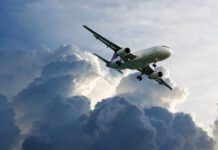I was in the Peace Corps in the early 1970s in Colombia, so I learned Spanish. A few years later, January, 1977, I took my girlfriend in my Cessna 150 for a three-week trip around the Caribbean basin to visit Colombia. On the way we made a fuel stop at the main airport in Caracas, Venezuela. (We made a number of fuel stops in the 150, in fact.)
When we came back out to the plane in the morning, I called ground control, saying “Maiqueta Ground, Cessna 436FK requests permission to relocate over to the fuel truck area to get fuel.”
I spoke in English, of course, because that is the international language of flight. The controller responded back in English saying, “Cessna 436FK cleared to taxi to runway zero eight.”
Hmmm…I tried again, speaking even more slowly and distinctly, using a slightly different phraseology, but got the same response about being cleared to taxi to the active.
Well, I speak Spanish, I said to myself. Maybe I should try that? So I made the same request in Spanish. Well, right away, loud and clear, in Spanish, the controller came back and said, “Well, why didn’t you say so! I’ll send the fuel truck right over for you.”
Brian Gately
Brooklyn, NY
Best radio call I’ve ever received:
Back in the days of the Cold War, I was fortunate to be stationed in England flying the F-111. While doing a maintenance acceptance (test) flight following depot repair, I was on my way to the next test point on our card, which requires achieving 1.85 Mach to record engine parameters. From the depot location (Bristol England—home of the Concorde), the closest path to supersonic flight involves a westward course from Land’s End (toward the U.S.).
Unlike the USA, in Britain, air traffic control is split into military and civil sectors, so the civil traffic never hears the military aircraft and vice versa.
I was around FL450, climbing at 1000 fpm or so, and Mach 1.45 and accelerating, and I received the following series of transmissions from London Mil (essentially the “center” for military traffic):
London Mil: “Sapphire 32, London, traffic…” (the iconic British pause).
London Mil: “Sapphire 32, London, traffic is 7 o’clock…” (again, the Brit pause)
London Mil: “…passing…”
Okay, that had my attention!
London Mil: “…Concorde.”
And the Concorde skipper brought that beautiful machine not more than a mile off my wingtip, four Rolls Royce afterburners full-ablaze in all their glory—a sight I shall never forget.
Jim McIrvin
Warrenton, VA
I was flying across Georgia this week when I heard a pilot on the radio with a rich Southern accent and an “Aw shucks” kind of attitude call in on frequency.
Pilot: “N1234 at 6000.”
ATC: “Welcome back. We’ve been trying to reach you for the last 60 NM.”
Pilot: “Yeah that’s what the last controller said. She was real pissy.”
ATC: “We all are.”
Richard R Boyd
Seaford, DE
Departing Oakland, California, we overheard the following:
N12345: “NorCal Approach, N12345.”
NorCal: “N12345, NorCal Approach, go ahead.”
N12345: “NorCal, we’re on a photo mission and we’d like to operate in the Class Bravo airspace at various altitudes and locations.”
(After a long pause) NorCal: “N12345, could you be a bit more specific?”
N12345: “Uh, mostly around San Francisco.”
NorCal: “San Francisco, the city, or San Francisco, the airport?”
(Another long pause) N12345: “Um, I thought we sent some paperwork over about this. Do you have it?”
NorCal: “N12345, NorCal. Negative.”
N12345: “I guess we could try to find that and send it over.”
NorCal (in a surprisingly friendly tone of voice): “N12345, NorCal Approach. I’m actually not comfortable granting a Bravo clearance with absolutely no idea where you intend to go. Maintain own navigation outside the Class B airspace.”
N12345: (sheepishly): “Roger.”




